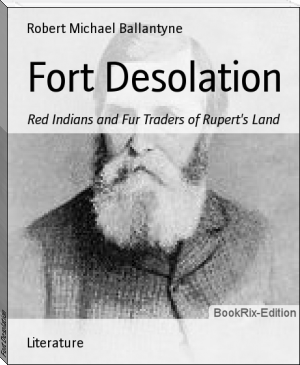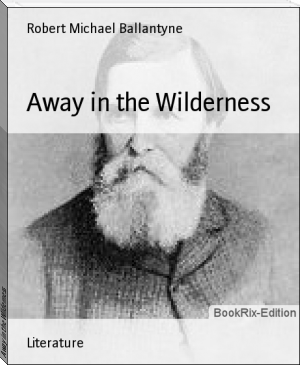Fort Desolation, Robert Michael Ballantyne [10 best novels of all time .TXT] 📗

- Author: Robert Michael Ballantyne
Book online «Fort Desolation, Robert Michael Ballantyne [10 best novels of all time .TXT] 📗». Author Robert Michael Ballantyne
As he walked along the slight track which guided him towards them, he pondered the circumstances in which he then found himself, and, indulging in a habit which he had acquired in his frequent and prolonged periods of solitude, began to mutter his thoughts aloud.
"So, so, Jack, you left your farm because you were tired of solitude, and now you find yourself in the midst of society. Pleasant society, truly!--bullies and geese, without a sympathetic mind to rub against. Humph! a pleasant fix you've got into, old fellow."
Jack was wrong in this to some extent, as he afterwards came to confess to himself, for among his men there were two or three minds worth cultivating, noble and shrewd, and deep, too, though not educated or refined. But at the time of which we write, Jack did not know this. He went on to soliloquise:
"Yes, you've got a pretty set to deal with; elements that will cause you enough of trouble before you have done with them. Well, well, don't give in, old chap. Never say die. If solitude is to be your lot, meet it like a man. Why, they say that solitude of the worst kind is to be found where most people dwell. Has it not been said, that in the great city of London itself a man may be more solitary than in the heart of the wilderness? I've read it, but I can't very well believe it. Yet, there _may_ be something in it. Humph! Well, well, Jack, you're not a philosopher, so don't try to go too deep; take it easy, and do the best you can."
At this point Jack came suddenly in sight of the vats. They stood in the centre of a cleared space in the forest. On the edge of the largest vat was perched an object which induced our hero to throw forward his fowling-piece hastily. It was a black bear, or rather the hind-quarters of a black bear, for the head and one paw and shoulder of the animal were far down in the vat. He was holding firmly to its edge by the hind legs and one fore-leg, while with the other he was straining his utmost to reach the fish.
Jack's first impulse was to fire, but reflecting that the portion of the bear then in view was not a very vulnerable part, he hesitated, and finally crept behind a tree to consider, feeling confident that whatever should occur he would be pretty sure of getting a favourable opportunity to fire with effect.
Quite unconscious of his danger, bruin continued to reach down into the vat with unwearied determination. His efforts were rewarded with success, for he presently appeared on the edge of the vat with a fine salmon in his embrace. Now was Jack's opportunity. He raised his piece, but remembering Marteau's remark about the bear's difficulty in eating salt salmon, he postponed the fatal shot until he should have studied this point in natural history.
His forbearance met with a reward, for the bear kept him during the next five minutes in such a state of suppressed laughter, that he could not have taken a steady aim to have saved his life. Its sense of smell was evidently gratified, for on leaping to the ground it took a powerful snuff, and then began to devour the salmon with immense gusto. But the first mouthful produced an expression of countenance that could not be misunderstood. It coughed, spluttered, and sneezed, or at least gave vent to something resembling these sounds, and drew back from the fish with a snarl; then it snuffed again. There was no mistaking the smell. It was delicious! Bruin, disbelieving his sense of taste, and displaying unwise faith in his sense of smell, made another attempt. He had tried the head first; with some show of reason he now tried the tail. Faugh! it was worse than the other; "as salt as fire," as we have heard it sometimes expressed. The spluttering at this point became excessive, and it was clear that the bear was getting angry. Once again, with an amount of perseverance that deserved better fortune, the bear snuffed heartily at the fish, tore it to shreds with his claws, and then tried another mouthful, which it spat out instantly. Displaying all its teeth and gums, it shut its eyes, and, raising its head in the air, fairly howled with disappointment.
Jack now deemed it prudent to bring the scene to a close, so, calming himself as well as he could, he took a steady aim, and, watching his opportunity, fired.
The bear did not fall. It faced round in a moment, and, uttering a fierce growl, very unlike to its previous tones, rushed upon its enemy, who fired his second barrel at the creature's breast. Whether it was that Jack's fit of laughter had shaken his nerves so as to render him incapable of taking a good aim, is a matter of uncertainty, but although both shots took effect, the bear was not checked in his career. On it came. Jack had no time to load. He turned to run, when his quick eye observed a branch of a tree over his head within reach. Dropping his gun he bounded upwards and caught it, and, being unusually powerful in the arms, drew himself up and got astride of it just as the bear reached the spot. But bruin was not to be baulked so easily. He was a black bear and a good climber. Finding that he could not at his utmost stretch obtain a nibble at Jack's toes, he rushed at the trunk of the tree and began to ascend rapidly. Jack at once moved towards the end of the branch, intending to drop to the ground, recover his gun and run for it; but the movement broke the branch off suddenly, and he came down with such a crash, that the bear stopped, looked round, and, seeing his enemy on the ground, began to descend.
Although somewhat stunned by the fall, our hero was able to spring up and run in the direction of the hut. The bear was so close on his heels, however, that he had no chance of his reaching it. He felt this, and, as a last resource, doubled on his track like a hare and made for the banks of the river, which were twenty feet high at the place, intending to leap into the rapid and take his chance.
In this, too, he was foiled. His fall from the tree had partially disabled him, and he could not run with his wonted agility. About ten yards from the edge of the bank the bear overtook him, and it seemed as if poor Jack Robinson's troubles were at last about to be brought to an abrupt close. But Jack was self-possessed and brave as steel. On feeling the bear's claws in his back, he drew his knife, wheeled round, fell into its embrace, and plunged the knife three or four times in its side. The thing was done in a moment, and the two, falling together, rolled over the edge of the steep bank, and went crashing down through the bushes amid a cloud of dust and stones into the raging flood below. At the foot of the rapid, Marteau and one of the men happened to be rowing ashore with a load of fish.
"Hallo! what's that?" cried Marteau.
"Eh!" exclaimed his comrade.
"A bear!" shouted Marteau, backing his oar.
"And a man! What! I say!"
"Pull! pull!"
Next moment the boat was dancing on the foam, and Marteau had hold of the bear's neck with one hand, and Jack's hair with the other.
They were soon hauled to land, the bear in its dying agonies and Jack in a state of insensibility; but it took the united strength of the two men to tear him from the tremendous grasp that he had fastened on the brute, and his knife was found buried to the handle close alongside of bruin's heart!
CHAPTER SEVEN.
SOLITUDE.
On the day of his encounter with the bear, Jack Robinson sent Rollo up to the fort to fetch down all the men except O'Donel, in order that the fishery might be carried on with vigour.
Of course it is unnecessary to inform the reader that Jack speedily recovered from the effects of his adventure. It would be absurd to suppose that anything of an ordinary nature could kill or even do much damage to our hero. Beyond five deep punctures on his back and five on his breast, besides a bite in the shoulder, Jack had received no damage, and was able to return on foot to Fort Desolation a few days after the event.
On arriving, he found his man, Teddy O'Donel, sitting over the kitchen fire in the last stage of an attack of deep depression and home sickness. Jack's sudden appearance wrought an instantaneous cure.
"Ah!" said he, grasping his master's hand and wringing it warmly; "it's a blessed sight for sore eyes! Sure I've bin all but dead, sur, since ye wint away."
"You've not been ill, have you?" said Jack, looking somewhat earnestly in the man's face.
"Ill? No, not i' the body, if that's what ye mane, but I've been awful bad i' the mind. It's the intellect as kills men more nor the body. The sowl is what does it all." (Here Teddy passed his hand across his forehead and looked haggard.) "Ah! Mr Robinson, it's myself as'll niver do to live alone. I do belave that all the ghosts as iver lived have come and took up there abode in this kitchen."
"Nonsense!" said Jack, sitting down on a stool beside the fire and filling his pipe; "you're too superstitious."
"Supperstitious, is it?" exclaimed the man, with a look of intense gravity. "Faix, if ye seed them ye'd change yer tune. It's the noses of 'em as is wust. Of all the noses for length and redness and for blowin' like trumpets I ever did see--well, well, it's no use conjicturin', but I do wonder sometimes what guv the ghosts sitch noses."
"I suppose they _knows_ that best themselves," observed Jack.
"P'r'aps they does," replied Teddy with a meditative gaze at the fire.
"But I rather suspect," continued Jack, "that as your own nose is somewhat long and red, and as you've got a habit of squinting, not to mention snoring, Teddy, we may be justified in accounting for the--"
"Ah! it's no use jokin'," interrupted O'Donel; "ye'll niver joke me out o' my belaif in ghosts. It's no longer agone than last night, after tay, I laid me down on the floor beside the fire in sitch a state o' moloncholly weakness, that I really tried to die. It's true for ye; and I belave I'd have done it, too, av I hadn't wint off to slape by mistake, an' whin I awoke, I was so cowld and hungry that I thought I'd pusspone dyin' till after supper. I got better after supper, but, och! it's a hard thing to live all be yer lone like this."
"Have no Indians





Comments (0)